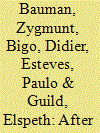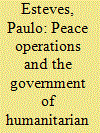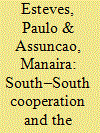| Srl | Item |
| 1 |
ID:
132383


|
|
|
|
|
| Publication |
2014.
|
| Summary/Abstract |
Current revelations about the secret US-NSA program, PRISM, have confirmed the large-scale mass surveillance of the telecommunication and electronic messages of governments, companies, and citizens, including the United States' closest allies in Europe and Latin America. The transnational ramifications of surveillance call for a re-evaluation of contemporary world politics' practices. The debate cannot be limited to the United States versus the rest of the world or to surveillance versus privacy; much more is at stake. This collective article briefly describes the specificities of cyber mass surveillance, including its mix of the practices of intelligence services and those of private companies providing services around the world. It then investigates the impact of these practices on national security, diplomacy, human rights, democracy, subjectivity, and obedience.
|
|
|
|
|
|
|
|
|
|
|
|
|
|
|
|
| 2 |
ID:
099915


|
|
|
|
|
| Publication |
2010.
|
| Summary/Abstract |
The article identifies how the nexus between democracy, security, humanitarianism and development was built up from the 1990s. It analyses how the discourse of post-conflict peacebuilding has emerged as a notable component of a liberal democratic international order. The article argues that the transformations in peacekeeping operations depend upon a specific spatiotemporal combination - a cleavage between a global and a humanitarian space and the temporality of development. For South American countries, participation in peacekeeping operations became a way to assert themselves as participants of a liberal democratic international order and a reflexive mode to strengthen the process of transformation of their own societies in order to be integrated into a new global cartography.
|
|
|
|
|
|
|
|
|
|
|
|
|
|
|
|
| 3 |
ID:
136050


|
|
|
|
|
| Summary/Abstract |
This article discusses the transformation in development architecture, focusing on the role of emerging powers and the growing relevance of South–South cooperation (ssc). Drawing on a conceptual toolkit based on the work of Pierre Bourdieu, it aims to approach ssc as a narrative and to understand the processes of contestation that have turned international development into a battlefield since the end of the 1990s. The article argues that the emergence of ssc has contributed to decentring the field of international development, both in terms of the agents authorised to play and the practices considered legitimate. Within this process the Global Partnership for Effective Development Cooperation, led by the oecd’s Development Assistance Committee, and the United Nations Development Cooperation Forum have become two sites on the battlefield on which the borders of international development are being redrawn.
|
|
|
|
|
|
|
|
|
|
|
|
|
|
|
|